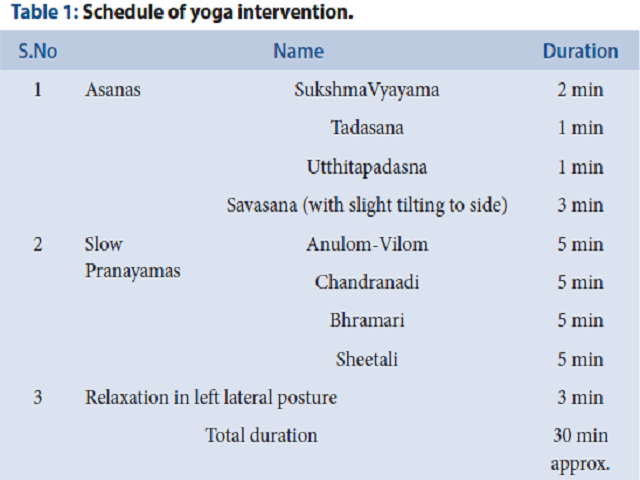Improvement in Fetomaternal Outcomes and Cardiovascular Health in Gestational Diabetes Mellitus following a Short-course Yoga Therapy
Abstract
Background and Aim: Though the effects of yoga on fetomaternal outcomes in GDM have been assessed earlier, a complete cardiometabolic profile and fetomaternal outcomes have not been studied yet. Also, there is no report of practice of a short course yoga therapy administered prior to parturition in GDM patients. Therefore, in the present study, effects of a structured short-course yoga module on cardiometabolic risks, fetomaternal outcomes and psychophysical health in GDM were assessed. Methods: A total of 21 pregnant women diagnosed to have GDM, admitted to Obstetrics Ward of tertiary care hospital prior to their delivery were recruited for the study. Anthropometric indices such as height, weight and BMI were calculated. Cardiometabolic risk (CMR) parameters such as heart rate (HR), systolic blood pressure (SBP) and diastolic blood pressure (DBP) were recorded, and rate pressure product (RPP) was calculated. The psychophysical health was assessed by using two questionnaires such as Perceived Stress Scale (PSS) scoring and Quality of Life (QoL) scoring. The participants were provided yoga therapy consisting of basic asanas and slow pranayamas daily and the schedule continued till their delivery. Yoga therapy was administered for a minimum of seven days and maximum of ten days. All the parameters before and after yoga were compared. Correlation of RPP, the marker of myocardial work stress was done with various parameters to assess the association of stress and metabolic status with the cardiovascular (CV) risk. Results: There was a significant decrease (P=0.000) in BHR, SBP, DBP, RPP after yoga intervention when compared to the pre-yoga assessment. There was also a significant decrease (P=0.001) in blood glucose after yoga intervention. The comparison of PSS and QoL before and after yoga intervention revealed a significant reduction in stress level (P=0.000) and improvement in QoL (P=0.000) after yoga intervention. RPP was significantly correlated with PSS. Conclusion: Practice of yoga for about one week consisting of basic asanas and slow pranayama significantly decreases blood glucose and stress levels and improves fetomaternal outcomes in GDM patients. The myocardial work stress in GDM patients could be linked to the psychological stress in them.






